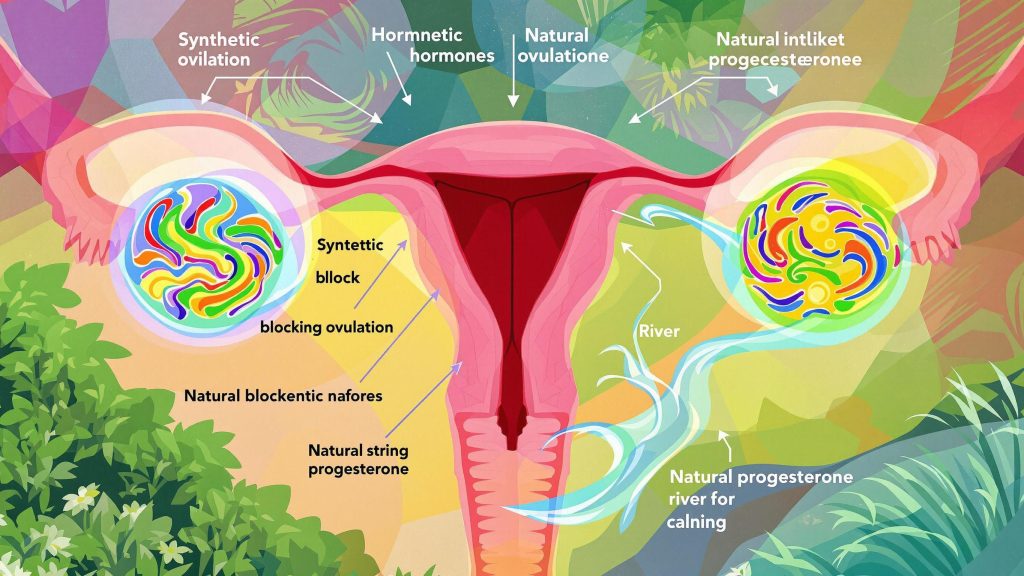What No One Told You About the Pill: It’s prescribed like candy and marketed as a miracle. But what if hormonal birth control was never designed to balance your hormones?
What if it’s been disrupting them all along—silently shifting your biology in ways your doctor never explained?
A Brief History of Hormonal Birth Control
Approved in the 1960s, the birth control pill was revolutionary for women’s autonomy. However, early versions contained dangerously high doses of synthetic hormones, leading to blood clots, severe mood disorders, and fertility suppression.
The formula was later altered—not for hormonal harmony—but to reduce life-threatening risks. Today’s “low-dose” versions still rely on synthetic compounds that silence natural rhythms.
How Birth Control Works: The Biochemical Mechanism
The pill suppresses ovulation by flooding your body with synthetic estrogen and progestin. This hormonal override tells your brain that you're pregnant, constantly.
The pituitary gland stops releasing luteinizing hormone (LH) and follicle-stimulating hormone (FSH), halting ovulation. No ovulation means no natural progesterone. Your natural cycle? Disrupted entirely.
Synthetic Hormones vs. Natural Hormones
Your body produces estradiol and progesterone in rhythm with your cycle. These hormones signal everything from skin clarity to metabolism.
Synthetic versions—like ethinyl estradiol and levonorgestrel—bind to hormone receptors but do not behave identically. They block natural hormone production and impair the ovaries' and brain's feedback loop.
What Happens to Ovulation on the Pill

Ovulation isn’t just for fertility—it’s a cornerstone of female health. It stabilizes mood, preserves bone density, boosts metabolic rate, and balances insulin.
Without it, the body misses progesterone’s calming, anti-inflammatory, and protective effects. The longer ovulation is suppressed, the greater the biological toll.
The Estrogen Dominance Dilemma
Though the pill is marketed as “balancing” hormones, it often induces estrogen dominance. Synthetic estrogen overwhelms the liver’s detox capacity, recirculates in the bloodstream, and creates symptoms such as:
- Persistent bloating
- Anxiety and mood swings
- Water retention
- Headaches or migraines
- Fat storage around the hips and thighs
These symptoms are often misdiagnosed when, in reality, they stem from hormonal overload, not deficiency.
The Cortisol Connection: Chronic Stress on the Pill
Long-term birth control use may elevate cortisol, your primary stress hormone. Chronic cortisol disrupts thyroid function, slows digestion, and interferes with sleep.
You may feel “wired but tired”—alert during the day but exhausted underneath. Many women on the pill report difficulty winding down, poor sleep quality, and increased susceptibility to stress.
Liver Overload and Impaired Hormone Clearance
The liver filters excess hormones from your system. But when overwhelmed by synthetic hormones, alcohol, caffeine, processed food, or environmental toxins, it slows down.
Estrogens begin to recycle instead of being eliminated. This “hormonal traffic jam” triggers skin issues, fatigue, irritability, and stubborn fat retention.
Gut Health and Birth Control: The Silent Sabotage
The gut is central to immunity, hormone clearance, and neurotransmitter production. The pill has been shown to:
- Reduce microbial diversity
- Increase candida overgrowth
- Weaken the gut lining (leaky gut)
- Alter serotonin levels
This can cause food intolerances, autoimmune flares, IBS, and anxiety. It’s why many women feel “off” without knowing the root cause.
Nutrient Depletions Caused by Birth Control

Hormonal birth control depletes critical vitamins and minerals, including:
- B-complex (especially B6 & B12): Mood, energy, detox
- Folate: Cell repair, fertility
- Magnesium: Blood sugar, anxiety, sleep
- Zinc and selenium: Thyroid health, immune balance
Without proper replenishment, even a “balanced diet” won't fix the internal deficiencies caused by long-term pill use.
How the Pill Alters Libido, Mood, and Motivation
Synthetic hormones suppress testosterone, the hormone responsible for sexual desire, assertiveness, and drive. Many women on birth control report:
- Diminished libido
- Emotional flatness
- Lower motivation or creative energy
This isn’t psychological—it’s biochemical. You weren’t broken. You were silenced at the cellular level.
The Disruption of the Gut-Brain-Hormone Axis
There’s a triangle between your gut, brain, and ovaries. When one is disrupted, the others follow. Birth control interrupts communication between these systems, dulling the intuitive mind-body signals that guide your appetite, mood, and hormonal rhythm. Over time, this can result in disconnection from your instincts.
The Myth of “Regulating Your Cycle”
Doctors often say the pill “regulates your cycle.” But the monthly bleed you experience on the pill isn’t a real period. It’s a withdrawal bleed, triggered by stopping synthetic hormones during the placebo week.
Real cycles involve ovulation, cervical fluid shifts, and natural hormonal peaks. The pill suppresses all of it.
Birth Control and the Risk of Masking Root Problems
Acne, painful periods, PCOS, endometriosis—many are prescribed birth control to “fix” these issues. But the pill doesn’t address the root cause.
It masks symptoms while inflammation, insulin resistance, or endocrine disruption continues beneath the surface.
Long-Term Effects on Fertility and Hormonal Resilience
Coming off the pill can reveal hormonal fragility. Common issues include:
- Delayed ovulation
- Luteal phase defects
- Irregular or absent periods
- Impaired cervical mucus production
- Thin uterine lining
The longer the suppression, the longer it may take to restore natural rhythms.
Post-Birth Control Syndrome: Symptoms and Triggers
This often appears 1–6 months after stopping the pill and can include:
- Acne flare-ups
- Irregular or painful periods
- Mood instability or depression
- Hair shedding
- Digestive disruption
- Weight gain or loss of muscle tone
These symptoms are signs of hormonal recalibration, not dysfunction. The body is relearning its natural rhythm.
The Rebound Effect: What Happens When You Stop
After stopping, estrogen may surge while progesterone lags. Androgens (like testosterone) can spike, causing acne, mood shifts, and oily skin.
This rebound can be minimized with preparation: nourishing the liver, restoring gut integrity, and easing into ovulation support.
Safer Alternatives: Fertility Awareness and Non-Hormonal Options
Modern Fertility Awareness Methods (FAM) are over 98% effective when practiced correctly. Tools like Daysy, Tempdrop, or Symptothermal tracking empower you to understand your cycle.
Copper IUDs, while not hormone-free, don’t suppress ovulation. These alternatives honor your biology while preventing pregnancy.
Healing After the Pill: A Holistic Reset Protocol

The body can heal, but it needs help. Consider the following support plan:
Liver Support
- Milk thistle, dandelion root
- Lemon water, cruciferous vegetables
- Dry brushing and castor oil packs
Gut Repair
- High-quality probiotics
- Bone broth, collagen, glutamine
- Remove inflammatory foods (gluten, dairy, sugar)
Nutrient Restoration
- Activated B-complex
- Magnesium glycinate
- Zinc and selenium
Hormonal Rebalancing
- Seed cycling for estrogen/progesterone support
- Ashwagandha or rhodiola for adrenal recovery
- Gentle movement (yoga, walking, pilates)
Depending on individual history, healing may take 3 to 12 months, but consistency creates progress.
Final Reflection: Informed Consent and Body Sovereignty
Birth control is a valid option, but it should come with full disclosure. You deserve to know that your hormones aren’t broken.
They’re sensitive, cyclical, and intelligent. Suppression isn't the only way. With the right tools, you can navigate your hormonal health with clarity, strength, and sovereignty.
Special Diet Cookbooks
Affiliate Disclosure: This article contains affiliate links. If you click and purchase, I may earn a small commission at no extra cost. This helps support content creation while providing you with trusted product recommendations.

